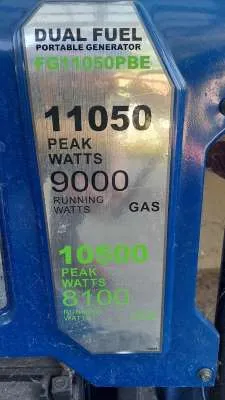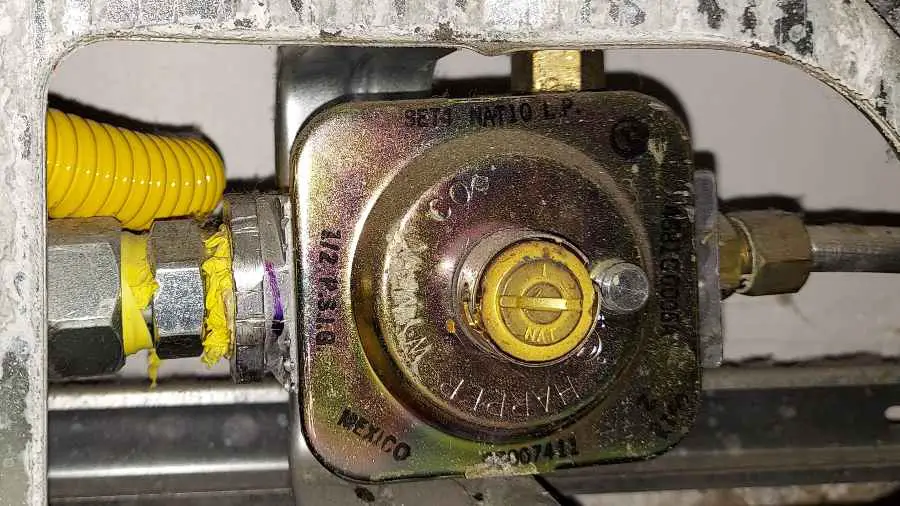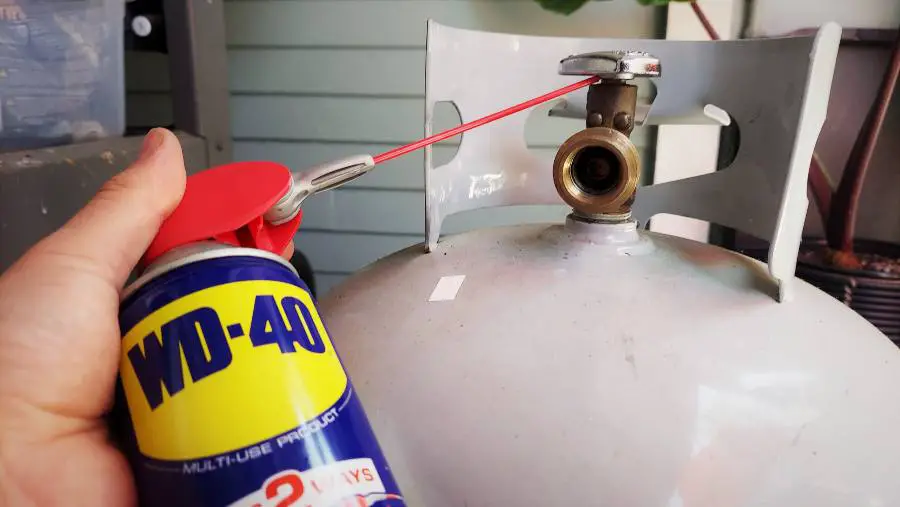Last Updated on June 21, 2024 by Dan Campbell
Living off grid requires a lot of planning and preparation, and one of the largest choices you’ll need to make is how you plan on powering your day-to-day life. Whether you use electricity to power lights, a refrigerator, or power tools, you’ll need a reliable source of power. A generator is a great tool to have whether you’re powering your entire home, using one as a backup, or you just need a portable source of electricity.
Do I need A Generator to Live Off Grid?
Of course not, but depending on how “off grid” you want to be a generator isn’t a bad idea, and I highly recommend having one. Think of a generator as any other tool. You could live with just a hand-saw, but having a chainsaw will make your life so much easier. Similarly, while you might rely on a renewable source of power like solar or wind, a generator will be able to fill in the gaps when those aren’t meeting your needs.
Even houses connected to a local utility grid can benefit from having a generator for backup power in the event of a power outage. The last thing you want is to be without power in times of need such as extreme weather. During such events a generator can provide you with enough power to last until your power can be turned back on, or until your primary source of power is running at 100% again.
For example, if your house is connected to a power grid a heavy wind storm could cause a power outage. If the utility company is unable to repair the damages within a day, you could potentially lose all of the perishable food in your refrigerator. Such an event even took place in Los Angeles in 2011, where more than 400,000 households throughout Los Angeles County lost power, with some not having power returned for a week. As someone who was there and was lucky enough to already own a generator, I was able to power most of my home’s essential appliances and keep our refrigerator running.
You can bet every store was sold out of generators too, so if you didn’t already own one the chances of you finding one for sale were slim. This is why I believe a generator is a vital piece of equipment every home should have. Even if you do not need to use one regularly, the peace of mind that comes with knowing you can power your home in an emergency is worth the cost.
When I was helping a friend of mine work on his solar-powered yurt we had a lot of questions about generators: what size does he need, how many watts should it be, and does he even need one if his home is solar-powered. That’s why I’ve gone ahead and answered some of those questions here and made an easy step-by-step guide in choosing an off grid generator that will fit your needs.
What Size Generator Do I Need For Off Grid?
When it comes to choosing a generator one of the first questions you’ll probably ask yourself is: “What size generator do I need”. Luckily, choosing a size of a generator can be as easy as following three simple steps.
The first step is to figure out what purpose the generator will serve. Do you plan on using it to power tools during construction? To power your entire house? Maybe you just need one that you can take on fishing or hunting trips. Or maybe you just plan on using it during times when you need to charge your batteries for when your main power generation source (such as solar) isn’t able to meet your needs like during maintenance.
The next step is to figure out how many watts of power you’ll need. You’ll need to calculate how many watts you are using, this is accomplished by adding up all the watts of appliances you plan to run at once. You’ll also need to account for starting watts. For example, an AC unit may only need 3kW for continual use, but when you first turn the unit on there will be a much higher demand, and your generator will need to be able to handle that surge.
The last step is selecting what type of fuel you plan on powering your generator with. Typically, the choice will be between diesel, gasoline, or propane. Each fuel source has its pros and cons, and depending on your needs you may choose one over the other. Some generators are even hybrids or dual-fuel and can use two types of fuel sources which may also be beneficial for you.
The Westinghouse WGen9500DFc is a dual fuel generator that features a larger gas tank than other generators, it’s ready to work on RV’s, and can power a large number of appliances. It also has some great additional features such as a remote start option, an ST Switch for use as a standby generator, and it has outlets directly on it for quick connections. It also has a CO sensor for added safety and a digital display to give you more information on the unit. If you’re just looking for a do-it-all generator, this is it.
This video by Randy Richard goes into more detail about the generator, including the ST Switch which allows this generator to work as a standby generator.
What Can A Generator Run
The first step I mentioned in choosing a generator is deciding what purpose your generator will serve. Do you need to power your entire house with a generator? Or do you just need to be able to run a refrigerator or maybe some power tools? Maybe you’re in an RV and only plan on using it when you cannot connect to an RV hook-up. First, let’s go over what purposes a generator can be used for. (hint: just about anything)
Can I Power My House With A Generator?
The average American home in 2020 used around ~30,000 watts of power per day, or 893Kw per month. Powering an average home will require a large generator such as a prime generator that can output multiple kilowatts of power. Your generator will need to be able to handle a large peak load and store a lot of fuel, or connect directly to a larger fuel source such as a propane tank or natural gas line.
Depending on your budget and fuel access, it is possible to power an entire house on just a generator. Prime Generators or Continual Use Generators can output over 15,000 watts and can run for 1,000s of hours at a time. Using a smaller generator can also run just the essentials in your home, but for shorter periods.
However, if you’re living off grid chances are you do not have access to a direct natural gas line and you’ll want to choose a prime generator that can connect to propane such as a Generac EcoGen 15kW generator. These large generators are not portable and need to be connected directly to a fuel source. While EcoGen generators are technically backup generators, they can be your main source of power too. Being off grid, you’re most likely not going to be using the same amount of power as an average American household. If you want to see how much fuel is required to run a Generac generator, check out my article “Generac Generator Fuel Consumption Chart & Calculator – All Models” to get an idea of how long a propane supply can last while running the generator 24/7.
The downside to using a generator for your main source of power is the noise and related costs. Generators are not quiet, and to power your entire home it would need to be running all the time which is loud and requires a lot of fuel. And part of the reason for living off grid is to enjoy the outdoors and to be away from city life, enjoying the quiet. A generator running 24/7 is not exactly “meditation friendly”.
Using A Generator For Backup & Charging Batteries
If you don’t need a generator to power your entire home at all times, you can also use a Stand-By Generator that will automatically turn on in the event of a power outage. This can be a great middle-ground if you are using solar, wind, or hydro as your main power source and you just want a safety net. Let’s face it, there are going to be days your solar panels are covered in snow, ice, or the sun just isn’t shining.
A standby generator will turn on once your batteries reach low enough levels and provide power to your house at the same time. A large generator that supplies close to 10,000 watts is your best option for this. With a large portable generator, you can even load it into a truck to move where you need. These can weigh hundreds of pounds.
The downside to using a backup generator, is well, none really. I think everyone who is living on self-reliant power needs to have a generator. There are too many possibilities for why your main source of power may not work. Having a backup generator eliminates any risk of unplanned power outages.
You’ll also want to make sure you choose a generator that features a 2-wire start or similar automatic start system if you plan on using a backup generator paired with solar or another source of power. An automatic start system on a generator will automatically turn on the generator when battery levels drop low enough.
Using A Generator For Everything Else
However, if you’re planning on using a generator for something else such as providing power for tools during construction, or to power a shed you might not need as powerful of a generator. Many generators ranging from 1,000 watts to 7,000 watts will be able to power everything you need, while also being more portable and versatile.
A small generator such as a 1,000 watt is great if you need a very portable power source for powering small items or taking them with you on trips. These are great if you need to take something to provide power during a hunting trip, or if you just need to power something farther away from your home.
The downside to using a smaller, more portable generator is the limited amount of power it can produce. Depending on your definition of portable (can be carried vs can be put in a truck bed), you’re looking at a generator that can produce somewhere around 2,000 watts. That’s enough to run most small appliances, but you’re definitely not going to be able to power much in the event of a power outage.
I would only recommend a smaller, more portable generator when you are first working on construction, or after you’ve purchased a back up generator. These also work great for RV use.
Generator Purpose Summary
By figuring out the main purpose of your generator, you should be able to easily decide if you want a large generator or something that is more portable and produces less watts. There is no reason to purchase a large, bulky generator producing 10,000 watts if you are only planning on using it to supply power to a system that is drawing 2,000 watts. You also do not want to select a small generator for being cheaper and more portable when the main purpose is going to be supplying power to your entire house and you are constantly having to refuel the generator.
Now that you know the purpose of the generator, we can work on figuring out what appliances you need to charge and how many watts you need to produce.
How Many Watts Do I need?
The most important factor when selecting a generator for off grid use is calculating how many watts you need. You’ll need to calculate how many watts you are using at peak demand and select a generator that can provide that much power and extra (for starting watts and additional appliances). To figure this out you can use a wattage worksheet to figure out how many watts you will need.
A wattage worksheet can be accomplished by doing the following:
- List all appliances that you plan on using with their wattage and starting watt requirements
- Add up all the appliances watts into a total
- Locate the largest starting watts
- Combine the total watts required, plus the largest starting watts
- This final number will be the total wattage rating for a generator you’ll need.
Example Wattage Worksheet:
| Appliance | Running Watts | Additional Starting Watts |
| Refrigerator | 700 | 2200 |
| Window AC | 1200 | 1800 |
| Electric Range | 2500 | 0 |
| Television | 500 | 0 |
| Lightbulb 60 Watt x 10 | 600 | 0 |
| Total/Highest: | 5,500 | 2,200 |
With this example, the total running watts is 5,500 watts, and the highest starting wattage is from the refrigerator at 2,200 starting watts. So you would need a generator with more than 5,500 running watts and 7,700 starting watts.
Starting watts are the additional watts needed for the first few seconds of powering on an appliance that has some sort of motor like a refrigerator or AC.
As an example let’s assume your 12,000 BTU window AC unit requires 3,250 running watts, it will require an additional 3950 starting watts to turn on. So you’re looking at a generator that needs to have a starting wattage greater than 7,200 watts. Most generators will list their rated wattage along with their starting wattage, some manufacturers list it as “Surge Watts” or “Peak Watts”.

So if you’re planning on powering your home with a generator, you’ll need to think of how many lights will be on, any appliances you’ll be using like a refrigerator or microwave, and any additional items such as laptops, TV’s, etc. This can easily get as high as 15,000 Watts if not more including starting watts.
Below are some common wattage estimates for common household appliances as listed by Home Depot.
| Appliance | Running Watts |
| Refrigerator/Freezer | 600-800 |
| Electric Range | 2,500 |
| Electric Furnace | 5,000-25,000 |
| Central Air Conditioning | 2,000-4,000 |
| Water Heater | 3,000-4,500 |
| Water Pump | 1,000-2,000 |
| Window Air Conditioner | 600-1,500 |
| Sump Pump | 1,500 |
| Microwave | 1,200 |
| Coffeemaker | 400-800 |
| Electric Oven | 5,000 |
| Television | 100-350 |
| Laptop | 500-2,000 |
| Vacuum | 700-1,400 |
| Space Heater | 1,250 |
| Table Lamp | 150 |
Wattage Summary
By combining all your appliance’s total watts and adding the largest starting watts, you can figure out exactly how many watts you need when selecting a generator. Make sure to always get a generator that gives you a little headroom in case you need to charge additional items, or your needs expand and you use more power. It’s better to have more power available then to get stuck in a situation where you cannot produce enough to meet demand.
Now that we know how many watts we need to supply to run all of our appliances we can select the type of fuel we plan on using. Depending on your location and availability of fuel, this option can be crucial.
Fuel Type: Diesel, Gasoline, and Propane
The main fuel sources for generators are diesel, gasoline, and propane. Each has its pros and cons, so it’s important to review the differences and figure out which option works best for you.
Diesel Generators
Diesel generators are very fuel-efficient compared to gasoline or propane, producing 138,700 BTUs/gallon. Gasoline produces 125,000 BTUs/gallon & propane 91,300 BTUs/gallon. Diesel is also typically cheaper than both gasoline and propane and requires less maintenance when compared to gasoline. Diesel is also less flammable than both gasoline and propane.
While diesel generators produce a lot of power efficiently and require less maintenance than gasoline, they are hard to get running below 15 degrees Fahrenheit and start facing difficulties at around just 40 degrees Fahrenheit. They are also much louder than gasoline or propane generators, and you might not be able to find diesel for sale at all gas stations.
For more detailed information, check out my article about the pros and cons of disel generators.
Pros and Cons of Using a Diesel Generator:
| Pros | Cons |
| Less expensive fuel costs | Fuel is not always available |
| Produces more power | Louder |
| Most fuel-efficient fuel | Cannot run during extreme cold |
| Less flammable than gasoline or propane | smaller available fuel tanks |
| Less maintenance than gasoline | |
| Fuel has a medium shelf life (6-12mo) |
Gasoline Generators
Gasoline generators are a great option because they have a higher wattage output than propane, gasoline can easily be purchased at gas stations, and it is typically less expensive than a propane generator producing similar wattage.
However, while they produce more power they also require more maintenance and produce more emissions. Gasoline also has a shorter shelf life than diesel and propane, and storing large quantities is difficult and hazardous. So if you’re planning on using a generator for extended periods, a propane generator may be a better option. Gasoline generators also require oil changes more frequently than propane-powered generators.
For more detailed information, check out my article about the pros and cons of gasoline generators.
Pros and Cons of Using a Gasoline Generator:
| Pros | Cons |
| Less expensive upfront/fuel costs | Smaller available fuel tanks |
| Produces more power | Louder |
| More fuel-efficient | Requires more frequent maintenance |
| Higher carbon footprint | |
| Fuel has a hort shelf life (1-3mo) |
Propane Generators

Propane generators are a great option if you want a generator that is quieter (typically), runs cleaner, and you want a generator that can be connected to a larger fuel source. Propane also has a very long shelf life, which is great for those times when you may not be able to travel and get to a gas station for a refill. Propane generators also do not have issues with starting in cold conditions, unlike diesel and gasoline. However, propane produces fewer watts and is less efficient than gasoline or diesel.
Since propane is also clean-burning, the oil stays cleaner longer meaning your generator will require less maintenance compared to a gas-operated generator. Propane generators do however cost more initially and propane typically costs more per gallon than gasoline.
For more detailed information, check out my article about the pros and cons of propane generators.
Pros and Cons of using a Propane Generator:
| Pros | Cons |
| Larger fuel storage is possible | More expensive upfront/fuel costs |
| Runs quieter | Produces less power |
| Less maintenance required | Less fuel-efficient |
| Fuel has a very long shelf life (30+years) | Requires heavy tanks |
| Can work in extreme cold conditions | Fuel may not always be available |
| Low Carbon Footprint |
Fuel Summary
As you can see, there are a lot of variables when it comes to selecting a fuel type. If you’re somewhere where it can get below freezing, or even below 0, you’re going to want to avoid a diesel or gasoline engine and want to select a propane or hybrid model. If refueling propane is not an option, and you are unable to get propane service to your location, you will want to select a diesel or gasoline generator. And lastly, if you have access to diesel and are not somewhere that is below freezing for most of the year, diesel will give you the most bang for your buck.
Now that you’ve figured out the best fuel source for your needs, you’re ready to go!
You’re Ready To Select An Off Grid Generator
Hopefully now with all this information, you’re ready to select the generator that works best for you. Or at least now you have a better understanding of the differences in some generators, and why certain sizes and fuel types have their pros and cons.
To reiterate the steps in choosing the right sized generator for your need:
- Figure out the purpose of your generator
- Figure out how many watts you need, including starting watts
- Figure out which fuel type works best for your situation
I hope you found this information helpful, and if you have any questions or recommendations please feel free to reach out. I strive to give the most accurate information I have, so if you see an error please let me know and I’ll be quick to address it. Have a great day and God Bless!
Sources for Data:




